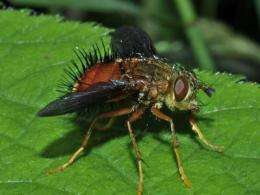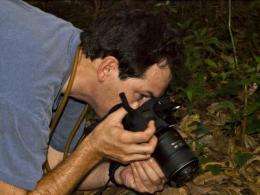NHM entomologist wins grant to investigate mega-diverse insect order

This week the National Science Foundation awarded a three-year $900,000 grant to co-investigators Drs. Brian Brown (Natural History Museum of Los Angeles County) and Art Borkent (Royal British Columbia Museum, Canada) to determine how many different species of flies live in a cloud forest in Costa Rica. Leading a team of 42 world experts, they will inventory all the species living in a 100 by 200 meter area (about 5 acres) and are estimating they will discover at least 3,000 species, many of them new to science. The survey begins in September 2012, and will take approximately three years to complete.
Twenty years ago E.O. Wilson, America's foremost ecologist, pointed out that though we know the number of stars in the galaxy, the mass of an electron, and the number of genes in a virus, we still have no idea of the actual number of species living on our planet. This statement is as true today as it was then. However, some of that uncertainty is going to change.

The Diptera, or true flies, already include more than 160,000 species worldwide — far more than the well-known mammals, birds, fish, reptiles, and amphibians combined. They are as vulnerable to extinction and habitat loss as these larger animals. But research on flies is far less advanced because flies are small and very diverse in their habits. Aside from the obvious pests and disease carriers, like house flies and some mosquitoes, most flies are actually beneficial as decomposers, pollinators, predators, and much more. An estimate of their true species diversity, with many thousands new to science, will allow scientists to better understand the importance they play in ecosystems, as well as gauge the impact of habitat change and loss affecting life everywhere.
As the first effort to comprehensively survey all species of a large, mega diverse group of invertebrates of a tropical forest location, this is potentially a landmark research project in tropical biology" commented one reviewer of the project. American Museum of Natural History Curator, Dr. David Grimaldi, agreed, "This will make a very important contribution to understanding the species diversity of a highly diverse but restricted tropical fauna. One really wonders how many species such an area holds, particularly new and endemic ones."
The project is unique among recent inventories as it will sample only a small area in Costa Rica. This is because the number of species presently unknown to science is overwhelming. "Most earlier attempts for complete surveys got bogged down by trying to do too much," said Dr. Brown, "but our survey is restricted to a small site that, with the help of many experts, will give us a complete list of species."
The site is a tropical cloud forest in the foothills in eastern Costa Rica, called Zurqui de Moravia."Previous research has shown that middle elevation sites, like this one, are the most diverse in the world," said Brown. "We wanted the site that had the most potential for high diversity and number of species new to science." Dr. Borkent noted "No one really knows how many species are actually present in a single location, anywhere in the tropics. This has been a huge gap in our understanding of biodiversity and how best to study and manage terrestrial ecosystems."
Provided by Natural History Museum of Los Angeles County